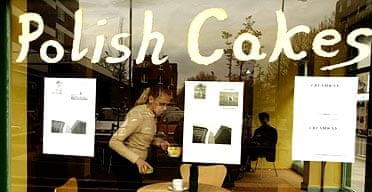Migrants are more highly skilled and often more reliable and hardworking than British workers and are fuelling the country's economic growth to the tune of £6bn a year, according to the first official study of their impact published today.
The report for the government's migration impact forum - which is considering the current restrictions on entry by Romanian and Bulgarian workers to the UK - also concluded that migrants on average earned more and so paid more tax than UK workers.
The joint Treasury, Home Office and Department for Work and Pensions study found that the arrival of hundreds of thousands of Poles and other east European workers had had "no discernible" impact on unemployment and had led to only a "modest dampening of wage growth" for British workers at the bottom end of the earnings league.
The report said 574,000 migrants came to live in Britain on a long-term basis in the 12 months to June 2006, and 385,000 left, giving a net incoming figure of 189,000 - down 28% compared with the previous year's net inflow of 262,000.
The first regional soundings by the government, also published today, showed that in seven out of eight regions in England migration had put pressure on housing, and five out of eight regions reported difficulties on crime and education.
The overwhelmingly positive official verdict on the economic and fiscal impact of the largest wave of migration to Britain in recent years is likely to prove highly controversial.
The shadow home secretary, David Davis, accused Labour ministers of ignoring the fact that relying on immigration to boost the economy was only a short-term answer.
But the immigration minister, Liam Byrne, insisted the report demonstrated that Britain was better off with immigration rather than without it.
He admitted, however, that the pace of change, particularly in communities that did not have a history of absorbing migrants, had been unsettling and had created challenges for public services.
Mr Byrne said it was time for a "new balance" in immigration policy.
The migration impact forum meets tomorrow to discuss whether the restrictions on Romanian and Bulgarian workers coming to Britain should be lifted. A decision is to be announced before the end of the year.
